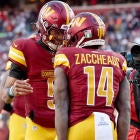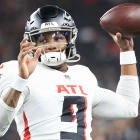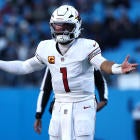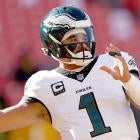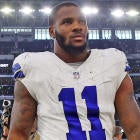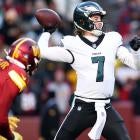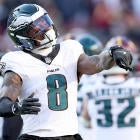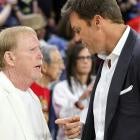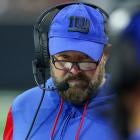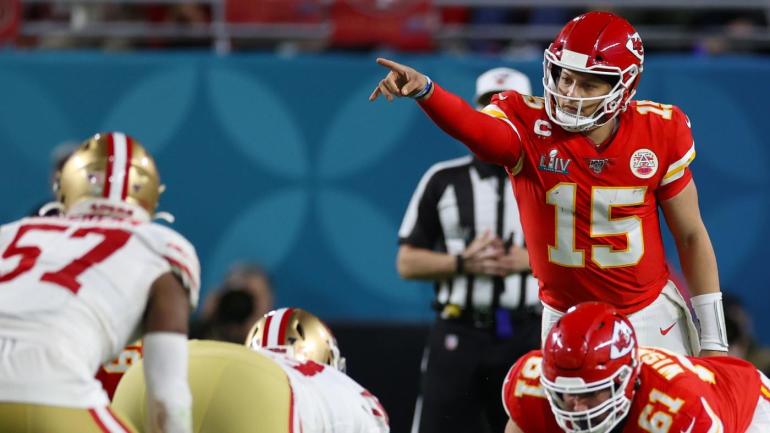
Often the difference between winning and losing in pro football comes down to one play. In each of the previous 57 Super Bowls, you can point to one play that, had the outcome of that play been different, it may have resulted in a different team hoisting the Lombardi Trophy.
The 49ers and Chiefs will look to make the defining play in Super Bowl LVII, joining the following list of plays that helped determine who won each of the previous 57 Super Bowls. The following plays not only helped determine the outcome of each Super Bowl, they helped mold the legacy of players, teams and coaches from several different eras.
As San Francisco and Kansas City prepare to face off, here's a look at the biggest turning points from every Super Bowl, plays that live on in NFL lore.
Super Bowl I: Packers 35, Chiefs 10
The AFL champion Chiefs hung with the NFL champion Packers in the first half. But Len Dawson getting intercepted by Willie Wood on the fourth play of the second half opened the floodgates. Wood's pick and subsequent 50 yard return set up Elijah Pitts' 5-yard touchdown run that made it a 21-10 game. The Packers pulled away for a 35-10 win.
Super Bowl II: Packers 33, Raiders 14
Down 12-0 early, the Raiders got on the board when Daryle Lamonica hit Bill Miller for a 23-yard score midway through the second quarter. But on their next possession, George Blanda missed a 47-yard field goal attempt, and the Packers made it a two-possession game on their ensuing possession. Green Bay never led by fewer than two scores for the remainder of the game.
Super Bowl III: Jets 16, Colts 7
The Jets can thank the halftime performers for their 7-0 lead at intermission. On the final play of the half, Colts receiver Jimmy Orr was wide open near the end zone after New York's defense got sucked in by Baltimore's trick play. Unfortunately for the Colts, quarterback Earl Morrall never saw Orr; legend has it that Orr blended in with the band that was preparing to enter the field for their halftime performance. Morrall instead threw to running back Jerry Hill but was intercepted by Jim Hudson. It was one of three interceptions thrown by Morrall, who was relieved by Johnny Unitas after Baltimore fell behind 16-0.
Super Bowl IV: Chiefs 23, Vikings 7
With their offense stuck in neutral, Minnesota's defense begrudgingly allowed three Jan Stenerud field goals in the game's first 23 minutes. But the Vikings' defense -- led by future league MVP Alan Page -- finally gave up a touchdown after Charlie West's fumble on Kansas City's ensuing kickoff following Stenerud's third field goal. Mike Garrett's 5-yard touchdown on a play called "65 Toss Power Trap" gave the Chiefs a 16-0 lead that proved insurmountable.
“65 Toss Power Trap!”
— NFL (@NFL) January 29, 2020
@Chiefs owner Norma Hunt recounts the play that will forever be etched in team history. #ChiefsKingdom#ALifetimeOfSundays now streaming on ESPN+ pic.twitter.com/8w7X5wZZqk
Super Bowl V: Colts 16, Cowboys 13
The Colts committed seven turnovers in Super Bowl V. But it was a Cowboys turnover that changed the complexion of the game. Down 13-6, Colts linebacker Rick Volk picked off Craig Morton's pass deep in Cowboys territory. The pick set up Tom Nowatzke's game-tying touchdown midway through the fourth quarter. Teammate Mike Curtis' interception in the game's final minute set up Jim O'Brien's game-winning field goal.
Super Bowl VI: Cowboys 24, Dolphins 3
A year earlier, Cowboys linebacker Chuck Howley became the first losing player to win Super Bowl MVP. With his team ahead 17-3 in Super Bowl IV, Howley's interception and subsequent 41-yard return set up the Cowboys' game-clinching score. Roger Staubach, the MVP of Dallas' first Super Bowl win, hit Mike Ditka for a 7-yard touchdown three plays after Howley's pick.
Super Bowl VII: Dolphins 14, Washington 7
A common theme, an interception in Super Bowl VII helped Miami capture the NFL's first perfect season. In a defensive grudge match, Dolphins linebacker Nick Buoniconti picked off Billy Kilmer's pass intended for running back Larry Brown. The interception set up Jim Kiick's 1-yard touchdown that gave Miami a 14-0 halftime lead. Washington's only score came late in the game on Mike Bass' recovery of Garo Yepremian's fumble on a muffed field goal attempt.
"Garo's Gaffe"#Dolphins kicker Garo Yepremian's mishap late in Super Bowl VII — one of the most unforgettable moments in Super Bowl history. OTD 1973. pic.twitter.com/SeNN1XJFIC
— Kevin Gallagher (@KevG163) January 14, 2022
Super Bowl VIII: Dolphins 24, Vikings 7
This one was never really close, as the Dolphins started the game with touchdowns on their first two possessions. But if there was a moment where this game could have gotten competitive, it was when the Vikings drove 74 yards to the Dolphins' 6-yard-line late in the first half. On fourth-and-1, however, Vikings running back Oscar Reed fumbled while trying to pick up the first down. Minnesota failed to score before halftime, and trailed 24-0 before finding the end zone.
Super Bowl IX: Steelers 16, Vikings 6
Pittsburgh's defense actually outscored Minnesota's offense on this day. Dwight White recorded the game's first score on a safety (the first in Super Bowl history), while the Vikings' only touchdown came off of a blocked punt. But the Vikings' offense was in position to give Minnesota a 7-2 halftime lead when Fran Tarkenton found receiver John Gilliam open inside the Steelers' 5-yard-line. Gilliam had barely touched the ball before he was blasted by safety Glen Edwards. The ball flew up in the air and was snared in by Steelers cornerback Mel Blount, as the Steelers took their 2-0 lead into halftime. The Steelers scored the game's first touchdown on the fourth play of the second half after the Vikings fumbled the half's opening kickoff.
Super Bowl X: Steelers 21, Cowboys 17
The Steelers found themselves trailing the Cowboys 10-7 entering the fourth quarter. After not scoring during the second and third quarters, Pittsburgh registered four unanswered scores to take a commanding 21-10 lead. The first score was a blocked punt for a safety by Steelers' defensive back Reggie Harrison. Pittsburgh then kicked two field goals before Terry Bradshaw hit Lynn Swann for a 64-yard touchdown.
Super Bowl XI: Raiders 32, Vikings 14
This game's turning point occurred early in the proceedings. The Vikings' Fred McNeil blocked Ray Guy's punt, giving Minnesota the ball on the Raiders' 2-yard-line with five minutes left in the first quarter. Two plays later, the Raiders' defense stepped up with Willie Hall scooped up Brent McClanahan's fumble. The Raiders then drove 94 yards to score the game's first points. Oakland took off from there, as they led by as many as 26 points in what was a dominant victory under coach John Madden.
Super Bowl XII: Cowboys 27, Broncos 10
The Broncos had a faint pulse after making it a 20-10 game entering the fourth quarter. But the Cowboys' "Doomsday" defense snuffed out any thoughts in Denver of a comeback when Aaron Kyle recovered Norris Weese's fumble midway through the fourth quarter. The Cowboys put the game away on the very next play when running back Robert Newhouse threw a perfect pass to Golden Richards for a 29-yard score.
Super Bowl XIII: Steelers 35, Cowboys 31
Down 21-14, the Cowboys had a chance to tie the score on their final possession of the third quarter. Facing a third down on the Steelers' 10-yard-line, Roger Staubach threw a low pass in the end zone to tight end Jackie Smith. Smith was unable to hang on to Staubach's throw, as the Cowboys were forced to settle for a field goal. It was the first of several plays that went against the Cowboys, who surrendered two touchdowns in 18 seconds in the fourth quarter before scoring two late touchdowns. Unfortunately for Dallas, it was too little too late, as the Steelers became the first team to win three Vince Lombardi Trophies.
Super Bowl XIV: Steelers 31, Rams 19
The Steelers were on their heels at the start of the fourth quarter. They trailed the scrappy Rams, 19-17, and one of their best players, receiver Lynn Swann, was out of the game with a concussion. But fellow wideout John Stallworth stepped up with a 73-yard touchdown catch on a third-and-8 play with 12:15 left. Stallworth's 45-yard catch later in the quarter set up Franco Harris' game-clinching touchdown run.
No. 45: @Steelers QB Terry Bradshaw TD pass to John Stallworth in @SuperBowl XIV (Jan. 20, 1980) #NFL100
— NFL (@NFL) September 14, 2019
📺: NFL 100 Greatest Plays on @NFLNetwork pic.twitter.com/q6ZKAhjfib
Super Bowl XV: Raiders 27, Eagles 10
A penalty was the turning point in this Super Bowl. Down 7-0, the Eagles appeared to tie things up when Ron Jaworski hit Rodney Parker in the end zone on 40-yard completion. The score didn't count, however, as receiver Harold Carmichael was flagged for jumping offsides. The Eagles, who punted two plays later, fell behind by two touchdowns after Jim Plunkett and Kenny King connected on an 80-yard touchdown. Oakland never led by less than 11 points the rest of the way en route to becoming the first wild card team to win the Super Bowl.
Super Bowl XVI: 49ers 26, Bengals 21
Trailing 20-0 at halftime, the Bengals needed to play a perfect second half to defeat the 49ers. Cincinnati nearly did but came up short on a few big plays, the biggest ones one coming from the 49ers' 1-yard-line at the end of the third quarter. The Bengals were unable to gain that final yard on three straight plays as the 49ers recorded the greatest goal line stand in Super Bowl history. Cincinnati, which trailed 20-7 at the time of the 49ers' goal line stand, responded with two more touchdowns but ultimately ran out of time.
Super Bowl XVII: Washington 27, Dolphins 17
The Dolphins' Killer B's held Washington to just 13 points through the first three quarters of Super Bowl XVII. With a 17-13 lead, Miami nearly took control of the game after defensive end Kim Bokamper nearly caught his own deflection of Joe Theismann's pass inside Washington's 5-yard line. Had Bokamper hung on to the pass, he would have waltzed into the end zone while giving the Dolphins a double-digit lead. Instead, Washington scored the go-ahead touchdown on John Riggins' iconic 42-yard run on its next possession. Washington pulled away in the fourth quarter to win the franchise's first Vince Lombardi Trophy.
Super Bowl XVIII: Raiders 38, Washington 9
Down 14-3 with the first half winding down, Washington attempted a pass that would essentially end the contest. In a similar position during the teams' regular-season showdown, Washington had gained 67 yards on a screen pass from Theismann to running back Joe Washington. With that in mind, Raiders defensive coordinator Charlie Sumner replaced linebacker Matt Millen with Jack Squirek, a pass defense specialist. Sure enough, Theismann threw again to Washington, but this time, his pass was snared in by Squirek, who waltzed untouched into the end zone to give the Raiders a 21-3 halftime lead.
#Raiders reserve linebacker Jack Squirek's pick-six just before halftime in Super Bowl XVIII, OTD in 1984.
— Kevin Gallagher (@KevG163) January 22, 2022
A stroke of great coaching strategy by defensive coordinator Charlie Sumner, a fatal error by Washington. pic.twitter.com/91uvbUSfW5
Super Bowl XIX: 49ers 38, Dolphins 16
Miami led 10-7 before Joe Montana led three unanswered scoring drives to take a commanding 28-10 lead. On third-and-11 from the 49ers' 13, Dan Marino tried to get Miami back in the end zone just before halftime. But his pass intended for Mark Clayton was underthrown and broken up by Ronnie Lott. Miami had to settle for a field goal, which loomed even larger after the Dolphins kicked a second field goal moments later after the 49ers muffed the ensuing kickoff. Instead of a 28-20 halftime score, the Dolphins trailed 28-16 at intermission. Marino and the Dolphins' high-scoring offense was shut out by San Francisco's vastly underrated defense in the second half.
Super Bowl XX: Bears 48, Patriots 10
After a slow start, the Bears started to roll after getting some defensive turnovers. The second one, a Mike Singletary recovery of Craig James' fumble, set up Matt Suhey's 11-yard touchdown run that gave Chicago a 13-3 lead heading into the second quarter. The Bears scored 33 more points before the Patriots finally found the end zone.
Super Bowl XXI: Giants 39, Broncos 20
Trailing 10-9 at halftime, the Giants successfully converted a quarterback sneak by backup quarterback Jeff Rutledge on fourth-and-1 on the first drive of the second half. New York capped off the drive on Phil Simms' touchdown pass to Mark Bavaro, and the Giants would never trail again.
Super Bowl XXII: Washington 42, Broncos 10
The Broncos led 10-0 before Washington scored two quick touchdowns to start the second quarter. A 21-yard run by John Elway gave the Broncos a chance to halt Washington's momentum, but failed to do so after Rich Karlis missed a 43-yard field goal attempt. Timmy Smith gave Washington a 21-10 lead moments later on a 58-yard touchdown run. Washington went on to score a Super Bowl record 35 second quarter points.
Super Bowl XXIII: 49ers 20, Bengals 16
Bengals cornerback Lewis Billups dropped an interception in the end zone with Cincinnati ahead 13-6 at the start of the fourth quarter. Joe Montana made Billups pay on the next play, as he hit Jerry Rice for a game-tying, 14-yard touchdown. Montana ended the game with a game-winning toss to John Taylor with 34 seconds left.
Super Bowl XXIV: 49ers 55, Broncos 10
Believe it or not, this game was somewhat close for the first 15 minutes. The 49ers began to pull away at the end of the first quarter, when Tom Rathman picked up four yards on a fourth-and-1 play from Denver's 35-yard-line. The 49ers capped off the drive with a 2-yard touchdown pass from Montana to Brent Jones that put the 49ers ahead 13-3.
Super Bowl XXV: Giants 20, Bills 19
Down 12-10 at the start of the third quarter, the Giants picked up a critical first down when Mark Ingram broke several tackles to pick up the necessary yards on third-and-14 from Buffalo's 32-yard-line. Ottis Anderson gave the Giants the lead several plays later, as New York ultimately prevailed in the only Super Bowl that has been decided by one point.
No. 73: @Giants WR Mark Ingram’s catch on 3rd-and-13 in @SuperBowl 25 (Jan. 27, 1991) #NFL100
— NFL (@NFL) September 14, 2019
📺: NFL 100 Greatest Plays on @NFLNetwork pic.twitter.com/HsFWobusXk
Super Bowl XXVI: Washington 37, Bills 24
Ahead 17-0 at halftime, Washington started the second half with Kurt Gouveia's interception of Bills quarterback Jim Kelly on the first play of the second half. Washington made it a 24-0 game on Gerald Riggs' touchdown on the game's next play, as Buffalo was unable to overcome its massive deficit.
Super Bowl XXVII: Cowboys 52, Bills 17
The Cowboys' offense piled up points, but their defense also came up with a Super Bowl record nine forced turnovers. The biggest one occurred when Thomas Everett picked off Kelly on fourth-and-goal from the 1-yard line three minutes into the second quarter. The Cowboys, who were ahead 14-7 at the time of their goal line stand, took a 28-10 halftime lead en route to a 35-point victory.
Super Bowl XXVIII: Cowboys 30, Bills 13
Buffalo's 13-6 halftime lead dissolved 39 seconds into the second half. On the third play of the second half, James Washington scooped up Thurman Thomas' fumble and waltzed 46 yards to the end zone for the game-tying score. The Cowboys never trailed again en route to back-to-back titles.
Super Bowl XXIX: 49ers 49, Chargers 26
Down 28-10, the Chargers needed a spark to start the second half. Instead, San Diego went three-and-out on the opening drive of the second half after Tony Martin dropped Stan Humphries' pass on third-and-2. The 49ers put the game away on their ensuing drive, as Ricky Watters scored his third touchdown of the game on a 9-yard run.
Super Bowl XXX: Cowboys 27, Steelers 17
Larry Brown's second interception iced the game, but what transpired on the previous play set up Brown's game-winning play. Andre Hastings -- who caught a game-high 10 passes for 98 yards -- failed to hold on to Neil O'Donnell's pass on first down that would have given the Steeles a first down near midfield. O'Donnell, facing a heavy blitz, hit Brown in the numbers on the next play. Emmitt Smith put the game away with his second touchdown of the half two plays later.
Super Bowl XXXI: Packers 35, Patriots 21
Sometimes, the Super Bowl's biggest turning point has also been its biggest play. Such was the case Super Bowl XXXI. Seconds after Curtis Martin's touchdown made it a one-possession game, Desmond Howard's 99-yard kickoff return for a score took the wind out of the Patriots' sails. Neither team scored after that, as Reggie White and the Packers' defense dominated the game's final 17 minutes.
Super Bowl XXXII: Broncos 31, Packers 24
Facing a third-and-6 on the Packers' 12-yard-line, John Elway's "helicopter" run gained eight yards while setting up Terrell Davis' go-ahead touchdown late in the third quarter. The run dramatically shifted the game's momentum in the Broncos' favor, as Denver went on to upset the defending champion Packers. In the process, the Broncos snapped the NFC's 13-year winning streak in the big game.
No. 33: @Broncos QB @johnelway’s helicopter spin in @SuperBowl XXXII (Jan. 25, 1998) #NFL100
— NFL (@NFL) September 14, 2019
📺: NFL 100 Greatest Plays on @NFLNetwork pic.twitter.com/kyceJaOxD9
Super Bowl XXXIII: Broncos 34, Falcons 19
The Falcons failed to fully capitalize on their early scoring opportunities, and the Broncos made them pay for it. One play after Morten Anderson missed a 26-yard field goal attempt, John Elway hit Rod Smith for an 80-yard touchdown that gave Denver a 17-3 lead with five minutes left in the first half. The Falcons also came up short on a fourth-and-2 rushing attempt by Jamal Anderson after the Falcons' defense picked off Elway earlier in the half.
Super Bowl XXXIV: Rams 23, Titans 16
The Rams' prolific offense had gone dormant following Torry Holt's 9-yard touchdown to open the second half. The unit woke up, however, one play after the Titans tied the score on an Al Del Greco field goal with 3:08 left. Facing heavy pressure from Javon Kearse, Kurt Warner stood tall before delivering a strike to Isaac Bruce, who raced into the end zone for a 73-yard score. The Rams' defense then stood tall on the game's final play, as Mike Jones tackled Kevin Dyson one yard short of the end zone as time expired.
Super Bowl XXXV: Ravens 35, Giants 7
A pretty dull game overall, Super Bowl XXXV did have a pretty exciting sequence that included three touchdowns scored in a span of 27 seconds late in the third quarter. Unfortunately for the Giants, two of those touchdowns were by the Ravens, who responded to Ron Dixon's 97-yard kickoff return for a score with an 84-yard kickoff for a touchdown by Jermaine Lewis.
Super Bowl XXXVI: Patriots 20, Rams 17
One of the most infamous game-winning drives in Super Bowl history began with three short completions from Tom Brady to running back J.R. Redmond. The drive's big play was Brady's 23-yard completion to Tory Brown on a crossing route that moved the Patriots to the Rams' 36-yard-line. Brady then moved New England six more yards to set up Adam Vinatieri's game-winning, 48-yard field goal as time expired.
Super Bowl XXXVI, 20 years ago today
— Kevin Gallagher (@KevG163) February 4, 2022
~ The #Patriots' Final Drive ~
(2/2) pic.twitter.com/FCMXNXAO4f
Super Bowl XXXVII: Buccaneers 48, Raiders 21
The score was already 27-3 by the time Dwight Smith recorded his first of two pick-sixes off of Rich Gannon with 4:56 left in the third quarter. Smith's score proved to be significant, however, as the Raiders scored three consecutive touchdowns to make it a 34-21 game with 6:14 left. But the Raiders ultimately ran out of time as Tampa Bay took advantage of Oakland's pass-heavy offense with two more pick-sixes to end the game.
Super Bowl XXXVIII: Patriots 32, Panthers 29
One of the craziest fourth quarters in Super Bowl history ended in a somewhat anticlimactic fashion. After tying the score on a 12-yard touchdown from Jake Delhomme to Ricky Proehl, John Kasay's ensuing kickoff sailed out of bounds, leading to an inevitable game-winning drive by Brady. Five Brady completions -- with the capper being a 17-yard strike to Deion Branch -- in the game's final minute set up Vinatieri's 41-yard, game-winning field goal with nine seconds left.
Super Bowl XXXIX: Patriots 24, Eagles 21
In a game that was ultimately decided by three points, Rodney Harrison's first-quarter interception of Donovan McNabb proved to be a pivotal play. Adding insult to injury for the Eagles was the fact that a penalty against the Patriots had wiped out Asante Samuel's interception of McNabb on the previous play. Instead of capitalizing on the second chance, the Eagles turned the ball over deep in New England territory.
Super Bowl XL: Steelers 21, Seahawks 10
Pittsburgh was on the brink of pulling away until an interception pulled Seattle pulled to within four points. The Seahawks were driving early in the fourth quarter before Ike Taylor stepped in front of Matt Hasslebeck's pass intended for Darrell Jackson deep in Pittsburgh territory. Antwaan Randle El hit Hines Ward for the game-clinching score four plays later.
Super Bowl XLI: Colts 29, Bears 17
The Colts clinched their first Super Bowl win since moving to Indianapolis when Kelvin Hayden recorded a pick-six off Rex Grossman with under 12 minutes left. Bob Sanders intercepted Grossman on the Bears' next possession, as Indianapolis' defense outscored Chicago's offense during the second half.
Super Bowl XLII: Giants 17, Patriots 14
David Tyree's helmet catch was clearly the turning point, but Eli Manning's 12-yard completion to Steve Smith on third-and-11 three plays later was also significant. One play after hitting Smith, Manning lofted the game-winning strike to Plaxico Burress. Tyree and Burress made iconic catches, but the Giants also received clutch performances that night by fellow wideouts Smith and Amani Toomer, who caught a combined 11 passes for 134 yards.
13 years ago today, Eli Manning and David Tyree linked up for the helmet catch and the Giants went on to take down the undefeated Patriots in Super Bowl XLII 🏆
— Sports Illustrated (@SInow) February 3, 2021
(via @nflthrowback)pic.twitter.com/exsxYIp78O
Super Bowl XLIII: Steelers 27, Cardinals 23
James Harrison's 100-yard pick-six just before halftime was a huge momentum swing. But Super Bowl XLIII's true turning point was Ben Roethlisberger's 40-yard completion to Santonio Holmes with a minute left. The completion set up Roethlisberger's iconic, game-winning touchdown pass to Holmes that capped off one of the most exciting Super Bowls ever.
OTD in 2009
— Steel City Star (@steelcitystar) February 1, 2022
The Steelers win Super Bowl XLIII
Here’s the game-winning drive. @_BigBen7 @ToneTime10 pic.twitter.com/yMQ97DoEai
Super Bowl XLIV: Saints 31, Colts 17
The earliest-attempted onside kick in Super Bowl history spearheaded the Saints' second half comeback. Down 10-6 at halftime, New Orleans took its first lead six plays after Chris Reis recovered Thomas Morstead's onside kick to start the second half. The Saints never trailed again en route to the franchise's first Super Bowl win.
Super Bowl XLV: Packers 31, Steelers 25
Rashard Mendenhall brought the Steelers to within four points of the Packers five minutes into the second half. The Steelers were driving ahead when Packers linebacker Clay Matthews jarred the ball from Mendenhall's grasp on the first play of the fourth quarter. Green Bay then drove 55 yards to extend its lead to 28-17 with 12 minutes left. The Packers never relinquished the lead while denying the Steelers a seventh Vince Lombardi Trophy.
Super Bowl XLVI: Giants 21, Patriots 17
Manning's 38-yard completion to toe-tapping Marino Manningham was nearly as jaw-dropping as his completion to Tyree four years earlier. Like Tyree's catch, Manningham's clutch catch set up the Giants' game-winning score, as Ahmad Bradshaw's (inadvertent) touchdown run gave New York the lead for good with 1:04 left.
Eli Manning does it again.
— CBS Sports HQ (@CBSSportsHQ) February 5, 2020
Eight years ago today, Manning delivered a STRIKE to Mario Manningham and the Giants beat the Patriots in Super Bowl XLVI.
(via @nflthrowback)pic.twitter.com/hi8SHAYwTD
Super Bowl XLVII: Ravens 34, 49ers 31
This game will always be remembered for the 35-minute power outage. Had the 49ers, who were down 28-6 at the time of the outing, completed their comeback, this game would be remembered for a very different reason. The 49ers were on the doorstep of completing the comeback when Colin Kaepernick scored on the longest touchdown run by a quarterback in Super Bowl history (15 yards) with 10:04 left. But on the ensuing two-point try, Baltimore's blitz forced an early and errant pass from Kaepernick intended for Randy Moss. Had they converted on their two-point attempt, the 49ers would have only needed a field goal on their final drive instead of a touchdown. Baltimore held on to win the franchise's second Lombardi Trophy.
Super Bowl XLVIII: Seahawks 43, Broncos 8
There was some belief that the Peyton Manning and the Broncos' powerful offense would be able to overcome their 22-point halftime deficit. Those thoughts, however, went out the window when Percy Harvin took the second half kickoff 87 yards to pay dirt to give Seattle a 29-0 lead. The lead swelled to 43-0 before Manning and the Broncos finally found the end zone.
Super Bowl XLIX: Patriots 28, Seahawks 24
Down 10 points against the reigning Super Bowl champions, Tom Brady's 21-yard completion to Julian Edelman on a third-and-14 play jump-started the Patriots' comeback. The conversion, which occurred with 10:58 remaining, set up Brady's 4-yard touchdown pass to Danny Amendola. Brady then hit Edelman for the go-ahead score before Malcolm Butler's end zone interception of Russell Wilson.
Super Bowl 50: Broncos 24, Panthers 10
Malik Jackson's recovery of Von Miller's forced fumble summed up the Broncos' defensive dominance in Super Bowl 50. The score, which took place with 6:34 left in the first half, gave the Broncos a 10-0 lead over the favored Panthers. The Broncos never trailed while sealing the win following Miller's second forced fumble of Cam Newton with 4:16 left.
Super Bowl LI: Patriots 34, Falcons 28 (OT)
Down 28-12, Dont'a Hightower's strip-sack of Matt Ryan put the Patriots' comeback into high gear. The Patriots made it a one-possession game five plays after Hightower's big play. They tied the game following Edelman's fingertip catch on New England's last possession of regulation. Brady then orchestrated the first and only overtime drive in Super Bowl history, a drive that ended with James White's 2-yard touchdown plunge.
Five years ago tonight...
— Kevin Gallagher (@KevG163) February 6, 2022
Super Bowl LI
In a game with so many key plays, perhaps the most crucial of them all was Dont'a Hightower's sack fumble of Matt Ryan at Atlanta's 25 with 8:30 left in regulation.
The #Patriots would cash in quickly to make it a one-score game, 28-20. pic.twitter.com/1dH6SQxSPx
Super Bowl LII: Eagles 41, Patriots 33
The "Philly Special" has a permanent place in history, but another key play in the Eagles' first Super Bowl victory took place with 5:39 left. Trailing 33-32 and facing a fourth-and-1 on their own 45-yard-line, Nick Foles hit Zach Ertz for a 2-yard gain that moved the chains. Foles ended the drive with an 11-yard touchdown pass that proved to be the game-winning score.
Super Bowl LIII: Patriots 13, Rams 3
Fittingly, a defensive play was the turning point in the lowest-scoring Super Bowl in history. Protecting a 10-3 lead late in the fourth quarter, Stephon Gilmore was able to break up Jared Goff's potential game-tying completion to Brandin Cooks. Gilmore picked off Goff on the game's next play to set up Stephen Gostkowski's game-sealing field goal.
Super Bowl LIV: Chiefs 31, 49ers 20
In what was their trademark, the 2019 Chiefs capped off their Super Bowl run with one last comeback against the 49ers. Down 20-10, Patrick Mahomes' 44-yard completion to Tyreek Hill opened the door for a 21-point fourth quarter. Mahomes' two touchdown passes gave Kansas City the lead, while Damien Williams' 38-yard romp with 1:20 left capped off the Chiefs' first Super Bowl win in 50 years.
Down 10 in the 4th, the @Chiefs were running out of time... Then @PatrickMahomes and @cheetah gave KC new life 🔥
— FOX Sports: NFL (@NFLonFOX) May 1, 2020
📺:Rewatch Super Bowl LIV, TOMORROW at 8:00PM ET on FOX pic.twitter.com/BCZBguoGiG
Super Bowl LV: Buccaneers 31, Chiefs 9
As he did many times during his career, Tom Brady made the opposition pay at the end of the first half in what was his final Super Bowl. Aided by a 34-yard pass interference penalty, Brady gave the Buccaneers a 21-6 halftime lead with a 1-yard touchdown pass to Antonio Brown, Brady's third touchdown pass of the half.
Super Bowl LVI: Rams 23, Bengals 20
Bengals linebacker Logan Wilson's controversial holding call against Cooper Krupp turned a possible 4th-and-8 situation for the Rams into a first and goal with 1:44 left. Down by four points at the time of the penalty, the Rams took the lead for good three plays later when Kupp caught Matthew Stafford's short touchdown pass.
“Wilson gets called for defensive holding. It’s just not holding.” @MikePereira reacts to the defensive holding penalty on Bengals LB Logan Wilson late in the 4th Qtr of Super Bowl LVI. pic.twitter.com/u5i2MZ6oQJ
— FOX Sports: NFL (@NFLonFOX) February 14, 2022
Super Bowl LVII: Chiefs 38, Eagles 35
One of the Chiefs' strengths in recent years has been their ability to score in bunches. Kansas City showcased that strength in the fourth quarter against the Eagles, turning a 27-21 deficit into a 35-27 lead after scoring two touchdowns in less than three minutes. Patrick Mahomes' two touchdown passes over that span were sandwiched between a 65-yard punt return from Kadarius Toney, who was on the receiving end of Mahomes' first touchdown pass of the quarter.









